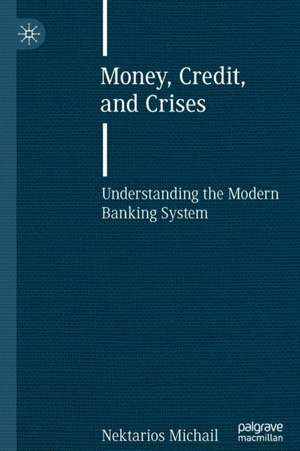Money, Credit, and Crises: Understanding the Modern Banking System
Autor Nektarios Michailen Limba Engleză Paperback – 27 ian 2022
| Toate formatele și edițiile | Preț | Express |
|---|---|---|
| Paperback (1) | 397.35 lei 3-5 săpt. | +22.01 lei 6-10 zile |
| Springer International Publishing – 27 ian 2022 | 397.35 lei 3-5 săpt. | +22.01 lei 6-10 zile |
| Hardback (1) | 527.88 lei 6-8 săpt. | |
| Springer International Publishing – 26 ian 2021 | 527.88 lei 6-8 săpt. |
Preț: 397.35 lei
Nou
Puncte Express: 596
Preț estimativ în valută:
76.03€ • 82.85$ • 64.07£
76.03€ • 82.85$ • 64.07£
Carte disponibilă
Livrare economică 02-16 aprilie
Livrare express 18-22 martie pentru 31.100 lei
Preluare comenzi: 021 569.72.76
Specificații
ISBN-13: 9783030643867
ISBN-10: 3030643867
Pagini: 251
Ilustrații: XV, 251 p. 66 illus., 18 illus. in color.
Dimensiuni: 155 x 235 x 17 mm
Greutate: 0.38 kg
Ediția:1st ed. 2021
Editura: Springer International Publishing
Colecția Palgrave Macmillan
Locul publicării:Cham, Switzerland
ISBN-10: 3030643867
Pagini: 251
Ilustrații: XV, 251 p. 66 illus., 18 illus. in color.
Dimensiuni: 155 x 235 x 17 mm
Greutate: 0.38 kg
Ediția:1st ed. 2021
Editura: Springer International Publishing
Colecția Palgrave Macmillan
Locul publicării:Cham, Switzerland
Cuprins
Part I: A History of Banking.- 1.A brief history of money and credit.- 2.Banking in the 20th Century.- Part II: How Banking Works.- 3.Money and Inflation.- 4.Money and Banking.- 5.Banking and the economy.- 6.Investment Banking.- 7.Banking in Crisis.- 8.Financial Instability.- Part III: Modern Banking.- 9.Securitization.- 10.Shadow Banking.- 11.Modern Crisis-Dealing Practices.- 12.Epilogue: The Future.
Notă biografică
Nektarios Michail is an Economist at the Department of Economic Analysis and Research at the Central Bank of Cyprus. He has previous experience in various positions in the finance industry, notably in brokers and investment funds, providing investment analysis on an array of financial instruments. Nektarios holds a PhD from the Cyprus University of Technology, where he taught for a number of years. His research, focusing on banking and economic policy as well as international and maritime economics, has been published in various academic journals.
Textul de pe ultima copertă
While paramount to the modern economy, understanding how the banking system works has been usually cast aside from overall economic education. Even in the aftermath of the recent financial crisis, which has underlined the vital importance of banking in the economy, the workings of the sector remain a black box. To this end, this book provides a comprehensive and easy to read review of the banking sector, covering all issues related to commercial and investment banking and providing experienced as well as non-expert readers the opportunity to expand their knowledge on these topics. After going through the book, readers have the opportunity to gain a deeper knowledge regarding the commercial and investment functions of the banking sector and the ability to evaluate the potential outcome of policy actions.
Nektarios Michail is an Economist at the Department of Economic Analysis and Research at the Central Bank of Cyprus. He has previous experience in variouspositions in the finance industry, notably in brokers and investment funds, providing investment analysis on an array of financial instruments. Nektarios holds a PhD from the Cyprus University of Technology, where he taught for a number of years. His research, focusing on banking and economic policy as well as international and maritime economics, has been published in various academic journals.
Caracteristici
Explains how the banking sector works in a simplified, concise but complete and comprehensive way Elaborates on how the banking sector connects with the economy, how financial crises can arise, and the impact these can have Showcases how the banking system is expected to develop in the near future and the extent at which policymakers can have an impact Evaluates various policy suggestions that aim to make the banking system more robust Overviews how regulators could plan their actions in order to minimize the damage made by a crisis while simultaneously not affecting the economy’s growth prospects
